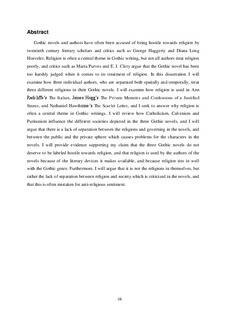| dc.description.abstract | Gothic novels and authors have often been accused of being hostile towards religion by
twentieth century literary scholars and critics such as George Haggerty and Diana Long
Hoeveler. Religion is often a central theme in Gothic writing, but not al l authors treat religion
poorly, and critics such as Maria Purves and E. J. Clery argue that the Gothic novel has been
too harshly judged when it comes to its treatment of religion. In this dissertation I will
examine how three individual authors, who are separated both spatially and temporally, treat
three different religions in their Gothic novels. I will examine how religion is used in Ann
Radcliffe‘s The Italian, James Hogg‘s The Private Memoirs and Confessions of a Justified
Sinner, and Nathaniel Hawthorne‘s The Scarlet Letter, and I seek to answer why religion is
often a central theme in Gothic writings. I will review how Catholicism, Calvinism and
Puritanism influence the different societies depicted in the three Gothic novels, and I will
argue that there is a lack of separation between the religions and governing in the novels, and
between the public and the private sphere which causes problems for the characters in the
novels. I will provide evidence supporting my claim that the three Gothic novels do not
deserve to be labeled hostile towards religion, and that religion is used by the authors of the
novels because of the literary devices it makes available, and because religion ties in well
with the Gothic genre. Furthermore, I will argue that it is not the religions in themselves, but
rather the lack of separation between religion and society which is criticized in the novels, and
that this is often mistaken for anti-religious sentiment. | nb_NO |
